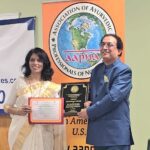Simple lifestyle modifications can help reduce your risk of Alzheimer’s and related dementias.
New Delhi, March 15, 2017: Nearly 4 million people are living with some form of dementia, in India. Promising research shows that you can reduce your risk of dementias through a combination of simple but effective lifestyle changes.
No matter what your age, it’s not too late to take steps to prevent memory loss.Brain- healthy lifestyle measures starting as early as young adulthood, can significantly prevent the onset of age induced Alzheimer’s and related dementias later in life. In addition, good health habits can reduce the risk for illnesses that might affect your memory as well as the likelihood that you’ll need medications that could have damaging side effects.
Padma Shri Awardee Dr K.K Aggarwal, National President Indian Medical Association (IMA) and President Heart Care Foundation of India (HCFI) and Dr RN Tandon – Honorary Secretary General IMA in a joint statement said that, “Alzheimer’s is a very complex disorder and has multiple risk factors. Risk factors like genetics and your age are beyond your control, however, some of these factors are modifiable and form the basis of a brain- healthy lifestyle. These include stress management, regular exercise, good sleep, healthy diet, mental stimulation and social engagement. A low-fat, high-fibre diet including plenty of fresh fruit and vegetables and whole grains can help reduce your risk of some kinds of dementia”.
Along with diet and exercise, it is important that you engage in regular mentally stimulating activities to keep those brain cells up and running. This is particularly beneficial for those who have crossed their 40s.
“Try doing light brain stimulating tasks like crossword puzzles, quizzes, daily reading or anything similar that interests you. For older individuals, it is advised that they engage their mental reserves through social engagement and exercise. For most people, a minimum of 150 minutes (2 hours and 30 minutes) of moderate-intensity aerobic activity each week, such as cycling or fast walking, is recommended.Good sleep should supplement these activities to obtain their full benefit”, adds Dr. K.K Aggarwal.
Following are the some crucial protection strategies against dementia and cognitive decline.
•Maintain a healthy weight.
•Check your waistline.
•Eat mindfully. Emphasize colorful, vitamin-packed vegetables and fruits; whole grains; fish, lean poultry, tofu, and beans and other legumes as protein sources; plus healthy fats. Cut down on unnecessary calories from sweets, sodas, refined grains like white bread or white rice, unhealthy fats, fried and fast foods, and mindless snacking. Keep a close eye on portion sizes, too.
•Exercise regularly. Aim for 2½ to 5 hours weekly of brisk walking (at 4 mph). Or try a vigorous exercise like jogging (at 6 mph) for half that time.
•Keep an eye on important health numbers. In addition to watching your weight and waistline, keep a watch on your cholesterol, triglycerides, blood pressure and blood sugar numbers.
•Smoking increases your risk of developing cardiovascular diseases, cancer and dementia.
•When possible, walk instead of driving or riding.
•Try keeping up with current affairs, learning a new hobby, and playing challenging games to exercise your mind.








I have learn some just right stuff here. Definitely value bookmarking for revisiting. I surprise how much effort you set to create any such wonderful informative site.
http://www.corburterilio.com/
I found your weblog web site on google and test a couple of of your early posts. Continue to maintain up the very good operate. I just extra up your RSS feed to my MSN Information Reader. Seeking ahead to reading more from you in a while!…
http://www.borvestinkral.com/
I take pleasure in, cause I found exactly what I was having a look for. You’ve ended my 4 day long hunt! God Bless you man. Have a great day. Bye
http://www.borvestinkral.com/